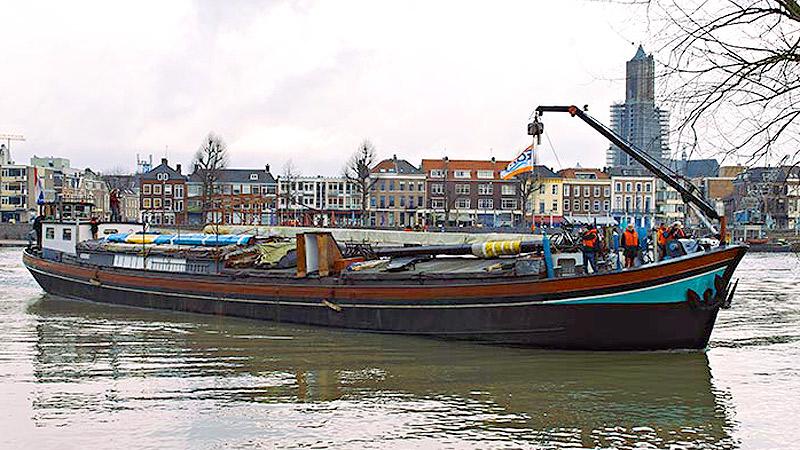The joint master program Industrial Ecology organises a course ‘Integrated Project Groups’ (from 2021/2022 on Sustainability Challenge). In this course a group of students from the program coming from different disciplines work on a consultancy assignment for an external commissioner and work on an assignment that requires an interdisciplinary perspective and puts their theory into practice.
From September 2020 until January 2021 four students joined forces and worked on an assignment for the Hugo Grotius Foundation. Tycho Jongenelen, Maddie Vollebregt, Dennis Hulsbosch and Hidde Boom, coming from bachelor studies ranging from Public Administration, Environmental Science, ranging to Maritime Technology, were asked to come up with an advice to sustainably restore the Hugo Grotius, a historic vessel.
The Integrated Project Group (IPG) is a 5-month course in which students from the Industrial Ecology master’s program get the opportunity to work with a real life commissioner on a sustainability challenge. Tycho, Dennis, Hidde and Maddie worked mostly remotely due to the pandemic on an assignment from the Hugo Grotius Foundation (NL). This foundation focuses on restoring the Hugo Grotius, a ship built in 1883 and marked as global heritage, in a sustainable way and offering educational programs on this ship.
As the ship is marked as global heritage, Maikel Kuipers and Rients de Boer from the Centre for Global Heritage were involved, which extended the interdisciplinary perspective of the project. Next to the topic of ships and sailing, the multitude of perspectives is also what attracted Hidde to work on this project.”So the basic reason for me to choose this project was it was about sailing boats, classic sailing boats, which is one of my hobbies, basically. And the supervisor was not from the IE department, as Maikel is from the Archeology department. And so this project was in particular very tangible because it was a shipt that is being restored, it's actually gonna be something that you're gonna use. So it doesn't just stay at numbers and text in a paper, but it's actually really something that you're building, basically”.
Heritage and Sustainability
Restoring the Hugo Grotius in a sustainable way proved to be a challenging assignment, because the two topics can clash. For example when it come to deciding which clean energy sources to apply when restoring the ship “You want to have sustainable energy on the ship, for example solar panels, or something that is very efficient, but those really influence the sight of the shi. They're not really pretty. And if you have a beautiful flagship, and you put those things on it, well it's just a shame for the aesthetic. So that's, for example, one problem. As a compromise the group of students came up with the advice to look at the option to make objects like solar panels detachable so the aesthetics of the ships can still be show. “So like there are times when they want to show those solar panels to show what can be done on historic ships. So it's definitely an interesting trade off, I guess.” (Maddie). As the trade-offs between heritage and sustainability are context specific there was not one specific recommendation from the team for the Hugo Grotius Foundation. It depends what’s best, said Hidde. “It really depends on the design basically on your.... So what is the goal of the project. If the goal is to be as sustainable as possible, then you want as much solar panels for example that you need. But if the goal is more related to keeping historic value, and wherever possible on making the ship more sustainable, then the question becomes very different. Then you're focusing more on keeping the original shape of the ship”.

Interdisciplinary Project Groups
The four students learned a lot from each other’s expertise. As Industrial Ecology offers only a master program students from different bachelor or undergrad programs can join. “I think it's an interesting program because you can really have any undergrad experience and join the program, so you learn a lot from your peers in any group” (Maddie). Working in an interdisciplinary project group requires trust in your own skills as well as the skills of your peers: “Believe in your own skills and in the others. Try to learn from the others. Read their parts. Question how that works or how this works. I think that’s the core Industrial Ecology is about. That you broaden your own scope and skills. (Dennis). The opportunity to work with a commissioner on real life assignment from practice made the four students gain valuable work experience and gave them the feeling they made an impact. It's also very nice to finally have something that's actually happening instead of some theoretical project you do for a month or two months in a course (Hidde).
Are you inspired by this story and would you like to share assignments on which Interdisciplinary student groups can work with us?
Submit them here!
